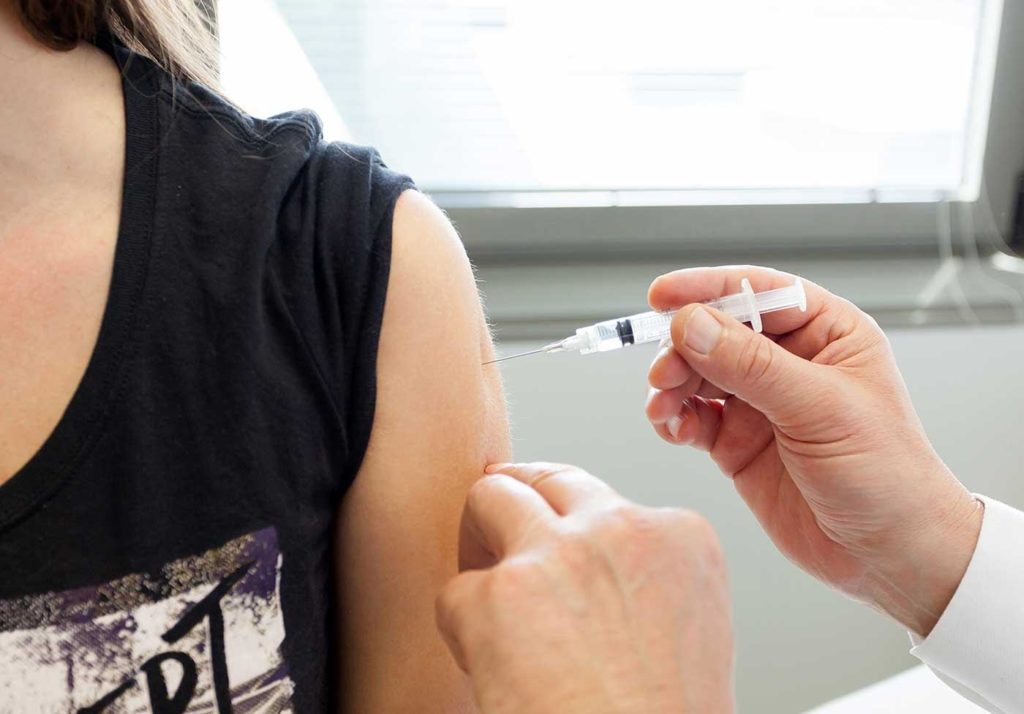Ouch
Last week I received the vaccine to prevent shingles. I hadn’t really considered getting the vaccine until recently. Afterall, what were the chances I would actually get this painful disease? I had heard stories from friends about people they knew who suffered the ill effects of shingles. Yet I didn’t know anyone personally who had suffered from it, so it became an “other” issue. You know, “other people” need to worry about it, not me. After all, only 1 in 3 people actually get shingles. What are the odds I will get it? It’s not that I am anti-vax; in fact, I am 100% for disease prevention! I really just didn’t want to bother with one. more. thing. on my to-do list.
In the course of a week, that changed.
Close friends and family began sharing stories about their sudden bouts with shingles. Then last week, three people I knew, on both the east and west coasts, were simultaneously grappling with the painful disease. Suddenly I realized that yes, I too, was at risk, despite believing otherwise. What put me at risk? My age. Yes, that’s it. Just my age. I needed a vaccine!
I drove to several local clinics to obtain this elixir of health, but they all had months-long waiting lists of those also eager to protect their health. The vaccine is in demand and people are clamoring to receive it. Alas, I found one location able to accomodate my request. With much relief, I gratefully had the first of two injections to help me stay healthy.
Side Effects
Unfortunately, I was one of the “1 out of 6” people who suffer from the ill effects of the vaccine. Sore arm, yes – everyone has that. But I also had chills, body aches, fatigue, and a general feeling of malaise. After about three days, I was back to my old self. No, that was not fun! However, suffering from shingles sounds way less fun. So, yes, I will return for my second vaccination in this series despite being aware of the temporary side effects. Are there super serious side effects from this vaccine? Of course, but those are literally 1 in a million.
The odds are in my favor.
What did I learn?
- I’m not special and I’m not superwoman. I am just as susceptible as the next person to contract the disease.
- The vaccine has side effects, but the disease is worse.
- My health is worth it.

You wonder, “So what does this have to do with me?”
Human papillomavirus is a virus that consists of over 100 strains. Some strains are pretty benign. However some strains can cause a lot of problems. Big problems.
Certain strains of HPV can cause genital warts and cancers of the vagina, vulva, cervix, penis, anus, and mouth.
Individuals get this virus from sexual activity, therefore it is considered a sexually transmitted infection (STI). Most sexually active people have contracted HPV at some point — it is the most common STI out there. Most of the time our bodies clear it — and we never even know we had it. However, sometimes people contract the strains that can cause cancer and/or warts. And sometimes our body doesn’t clear these particlar strains of HPV. Unfortunately, these diseases don’t make themselve known until well after the person is infected.
That’s the bad news.
The good news is there is a way to protect your kids from genital warts and cancer. Yes, we actually have a cancer vaccine!
Gardasil 9: Cancer Prevention Vaccine
It’s our job to prepare our kids for their adult lives, and sexuality is one aspect we cannot ignore. Your kids will have sex one day. (Don’t panic – that’s a good thing!)
Medical experts recommend that your child receive the vaccine, Gardasil 9, before they become sexually active, though they can certainly receive the vaccine after they’ve had sex. Ideally, you want to protect them before they are exposed to the virus, not after. It is similar to other preventative measures public health professionals tout: Put your seatbelt on before you have a car accident; wear your bike helmet before you crash; wear hat and gloves before you become frostbitten; wear sunscreen before you get skin cancer….you get what I’m saying.

There are several concerns that parents have when it comes to vaccinating their kids to prevent illness caused by HPV.
“I thought only girls are able to get the HPV vaccine.”
No,those who are biological boys, girls, and intersex are all able to get the vaccine.
Many parents push back on the vaccine because their child is not sexually active, or they do not believe their child will have sex for a very, very long time.
“My child shows absolutely no indication they they are romantically interested in anyone.” Well, they are 11. Give it a year or so.
A common story among adults is how they planned to wait until they were married to have sex…and then they turned 17 and suddenly Silly Sam became Sexy Sam. Some individuals engage in oral sex because they feel that is not “real sex” and they can still claim virgin status. (It is sex.) Besides, one can get HPV through oral sex.
My point is,”not sexually active” is not a realistic argument to withhold the HPV immunization from your kids, in fact, it is the very time to give it.
“Once they get the vaccine they’ll want to have sex.”
We begin vaccinating kids at the age of 11 (series of two doses). If your child wasn’t sexually engaged before, this vaccine will not magically turn them sexually promiscious. Heck, if that was a side-effect, every post-menopausal woman would be demanding this miraculous injection!
Consider this: Do parents routinely discuss with their children which disease each vaccine is preventing, why they’re getting it, and why it’s important to receive each vaccine? Or do they just say, “Oh, you have to get some shots today.” That’s what I thought. Your child won’t know what the vaccine is preventing unless you tell them.
So you have two options here. You can just tell them they are getting shots, or you can actually explain what this one is about. I vote for the latter. What a fantastic opportunity to talk to your child about relationships, sex, and the importance of staying healthy. 11 is not too young. Did you know that when you actually talk about this stuff, kids are more likely to wait before they engage in first sex and also have fewer partners? (Which also helps prevent STI transmission.) It’s a win-win!
“My doctor hasn’t mentioned anything.”
Healthcare providers are under a huge time-crunch. Perhaps they merely forgot. This is when you become your child’s advocate and bring it up yourself. I highly recommend a conversation between you, your child, and your provider. There may be underlying health reasons your child should abstain from this immunization.
“I don’t believe in sex before marriage.”
Okay. I respect your values. But what does your child believe? Besides, this has nothing to do with whether or not your child is married when they engage in sex. If your child’s sexual partner had previous sexual partners, even if your child has always abstained, your child can still be potentially exposed to HPV and other STIs.
“I heard the vaccine kills people.”
Ah, yes. This conversation is super important. There are definitely side effects with the vaccine (as there are with all vaccines) – the most common being a very, very sore arm. (Plan ahead – don’t get it before an important volleyball tournament.) Other effects can include fatigue, fever, nausea, headache. A lot like the shingles vaccine.
Fainting? Yes, that can happen, too, but typically that has nothing to do with the vaccine and more to do with the child’s reaction they experience with any medical procedure. Recently, health educators I know shared that each year they have someone faint in the classroom when they begin to discuss the reproductive system. Seriously – just discussion. But we certainly are not going to stop talking about the reproductive system, right?
As with anything, people can have an anaphylactic reaction to the vaccine. (They can also have an anaphylactic reaction to peanuts and shrimp and bees.) Yes, severe allergic reactions are experienced each year, however they are minimal compared to the 33, 700 cases of cancer diagosed each year – 31, 200 of which could have been prevented with the vaccine. According to the CDC, over the course of three years (2014-2017) 29 million doses of Gardasil 9 were given. Of those, there were 7,244 reports of reactions of which only 3% were deemed “serious” as reported by VAERS.*
Discuss your fears and concerns with your healthcare provider. They will review potential allergic reactions with you. Together, you, the healthcare provider and your child can decide if the vaccine is the right choice for your child. Do your homework. Access medically-accurate, scientifically-based information on the internet. Read the “about” page on the website to see who is behind the information to ensure the information is not skewing the facts to promote their agenda. (Keep in mind, statistics can be skewed to favorably support the agenda of certain groups.) The CDC is typically a great go-to resource. Other resources include WebMD, any hospital-affiliated resource, and of course your healthcare provider. Please avoid websites that cater to fear and feature isolated horror stories.

What can you do to help your child avoid STIs?
HPV is not the only STI that needs our attention and education, but it is the only one with a vaccine. Many other STIs can also be prevented. The most important way to prevent STIs is education. We can talk to our kids about the importance of safer sex so they can make informed, smart, choices. These conversations include talking about the importance of using condoms properly and consistently. Discussion should also include the importance of talking to their partners about mutal safer sex practices.
We can also prevent the spread of HPV and other STIs through testing. Testing for HPV is often done along with a pap smear, but there is not a test for men at this point. However, the other STIs such as gonorrhea, chlamydia, HIV can be tested through labwork. This can be done at your medical facility, Planned Parenthood, or at confidential clinics within your community. In our community the Open Door Health Services offers confidential testing. Alternatively, STDCheck.com is a great option for those who prefer an online testing option.
Vaccinations = Prevention
I shared my shingles vaccine story as a reminder that no one likes to go through the process of vaccinating. We all have our fears and doubts at times. But the discomfort we experience for a moment or a couple of days can prevent future devastating illness. I do know that some people absolutely should not receive vaccinations for health issues. And frankly, that is precisely why the rest of us should.
*VAERS (Vaccine Adverse Event Reporting System) is a safety monitoring arm of the CDC. Each adverse effect for all vaccines are documented and analyzed to ensure the safety and health of the population.
(Photos: Adobe Stock)


